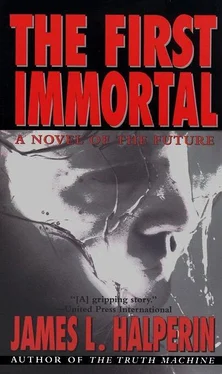“Yeah, those early suspensions were crude.”
“What does that mean?”
“Brain activity doesn’t shut down until the organ’s internal temperature falls below about twenty degrees centigrade. In the meantime, the brain restructures memories, creating all sorts of illusions. They must not have cooled your head fast enough. If you’d been suspended two years later, you never would’ve had to go through any of that. By 1990, every cryonics technician knew how to administer barbiturates to prevent brain activity from resuming during the CPR phase.”
Then Epstein had called up a VR presentation for Ben, illustrating the review-pointing mirages responsible for out-of-body experiences, and the exact neuronal phenomena that caused NDEs. He’d insisted that Ben sit through the twenty-eight-minute spectacle.
Christ, Ben thought, Carl must collect this stuff.
That was only a slight overstatement. During the seven years since his revivification, Epstein had spent an average of fifty hours per month studying the gradual scientific vindication of “the skeptics” and vilification of “the mystics.”
“Why didn’t anyone realize,” Carl would pontificate, “that if there were really such a thing as ESP, the Russians would’ve won. the cold war and all the casinos in Las Vegas would’ve gone broke?… The alien abduction delusion had existed throughout recorded history. First it was evil spirits, then witches, then Satan who abducted people. Finally, when Orson Welles’s War of the Worlds hoax implanted the fear of Martians into collective consciousness, it suddenly became flying saucers… Most religious adherents were only one step above suicide cultists; sheep vulnerable to the first available shepherd to lead them to the promised land; oblivious to the earthly bounty already at their feet… Recovered memories? Don’t get me started…”
But Ben had come to realize that, ironically, Epstein’s moralizing had another source: the man’s own subliminal mind. Throughout his entire life he’d lived alone, and preferred it that way. Ben figured that his friend subconsciously resented any intrusion into his space, and some part of Epstein was trying to drive him away.
“You know, Carl,” he said, “I can afford my own place. Just let me know when you’ve had enough of me, okay?”
This sudden change of topic caught Epstein’s attention. He seemed to choose his words with discretion, so as not to trigger the Truth Machine encircling Ben’s left index finger, perhaps. “You saved my life, Ben. I owe you.”
“Well, now we’re even.”
“When I revived you, I’d planned on three to six years. It’s only been sixteen months.”
“Sixteen and a half.”
“Actually, sixteen months and eighteen days,” Epstein said, smiling.
Ben had come to think of Epstein and himself almost as an old married couple, who often irritated one another, but had been forced by mutual need for the companionship and rapport of shared history, to tolerate—even cherish—their relationship. Besides, in a way, they truly loved each other.
Marge was gone forever. Ben’s children and grandchildren were all suspended or dead. His great- and great-great-grandchildren would call or visit occasionally, but other than Alica and me, he had little regular contact with us.
In 1988, the year of Ben’s suspension, living below the poverty line had often meant inhabiting the streets, struggling for necessities. Now it meant two-year-old AI chips and “basic” self-cleaning clothes with less sophisticated temperature control. It meant a fifteen- or sixteen-hour work week, not because one wanted to work—as most still did; even many who could afford not to—but because one needed a salary to afford travel to interesting places or to impress friends or potential sex partners.
It was the youngest who seemed to find the most to complain about. They became jealous of other people’s intelligence, wealth, fame, or spouses. In essence, the greatest resentments were directed at others’ happiness relative to their own, a truism of the human condition throughout history. People also bemoaned the fact that some had become less conversational, less literate, more dependent on machines and AIs. And many believed that civilization itself was deteriorating. But like Epstein, Ben remembered what the twentieth century had been like, and remembering was very different from watching low-definition movies or reading about it on a screen.
How could people actually believe that things were getting worse? he now wondered. Same way they always had, he guessed.
Ben often tried to weave instructive analogies that might help others glimpse the wonders they were overlooking—or seeing through. The best he could do was imagine what it might have been like for a twentieth century man sucked into some bizarre space/time continuum, landing in the year 1250. There, the “middle class” hoed dirt, lived in hovels, scratched lice, lost half their children to disease, and considered a person “old” at thirty-five. To Ben, the year 2073 related to 1988 almost as the year 1988 did to 1250. The analogy worked fine for him; he had a frame of reference for it. They didn’t.
What Ben Smith could not ignore was that even the poorest among them lived like kings and looked like gods.
Ben knew that the first year after his reanimation had been difficult for Epstein, upon whom he’d been totally dependent, not financially, but emotionally.
The leisure class now comprised nearly a fourth of the world’s population. Rare was the person who’d worked fifty years or longer who could not support him/herself on income earned from savings and investments. Most members of the so-called involuntary work force had been born after 2010.
During Ben’s hibernation, the Smith Family Cryonic Trust had first been looted, then fractionally restored. Through compound interest, it had grown to a respectable 1,462,588 World Currency Units, nearly double the value of Epstein’s surviving trust, and more than enough to maintain Ben in eternal comfort—assuming he had no one else to support.
But Ben, who’d never preferred to live alone, had always assumed, wrongly, that Epstein possessed the same need for companionship. At last he recognized his mistake.
Anchorage had been fascinating and, so long as Epstein kept his mouth shut, relaxing. Since weather control had been installed in urban areas there only thirteen years ago, almost all the construction was brand new; state-of-the-art. Alaska was now home for 79 million humans, nearly 0.8 percent of the world’s population, yet it seemed uncrowded somehow, even at 4.79 people per acre. Although the state had become a magnet for new colonizers, the efficiencies of its ultramodern structures allowed plenty of room for public lands.
On their return trip, Ben broached the subject Epstein had been avoiding. “Carl,” he said, “I’ve just made a decision to—”
“Wait,” Epstein interrupted, “I didn’t mean what I said before. At least not the way it sounded. I’m a loner by nature, but it’s awfully nice to have someone my own age to hang out with. Hardly anyone from our generation believed reanimation was possible.”
“I know. It’s sad.” Ben thought of Marge. Dust by now. He wanted to cry.
“Yeah. There aren’t too many of us around.”
“Hey, it’s not like we’d never see each other,” Ben said. “I’ll probably move back to the Boston area, maybe Somerville or Dorchester. We’d still be neighbors—only a few minutes apart—and I’ll always be grateful you guided me through this transition; made me feel secure and comfortable. It’s just that this existence is starting to become a little too, well, easy for me. I could see myself traveling around the world, or debating theology with you, or even spending days at a time in the VR pod. But I need a real life, a way to contribute. I can’t just live for hedonistic pleasure.”
Читать дальше












